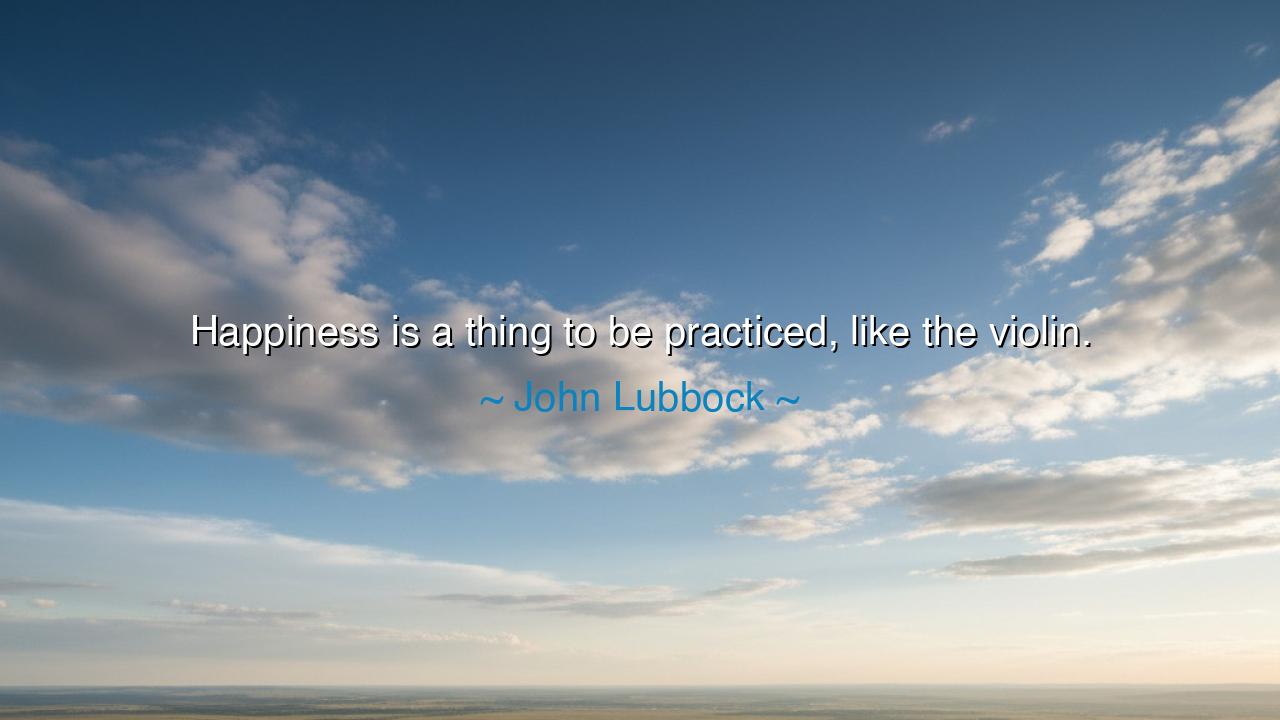
Happiness is a thing to be practiced, like the violin.






“Happiness is a thing to be practiced, like the violin.” Thus spoke John Lubbock, a philosopher of quiet insight and a lover of nature, whose words remind us that happiness is not a gift bestowed by chance, but an art that must be learned and tended, just as the musician learns his craft through patience and repetition. In this single sentence lies a wisdom that humbles and uplifts: joy is not an accident—it is a discipline, a daily exercise of the mind and heart.
The meaning of this truth is clear yet profound. Many pursue happiness as though it were a treasure to be discovered, hidden in wealth, fame, or fortune. But Lubbock, with the simplicity of a sage, teaches that happiness must be practiced, not found. Like the violin, it demands attention, refinement, and persistence. A player who picks up the instrument only in moments of passion will never master it; so too, the soul that seeks joy only in moments of ease will never truly know it. Happiness, he says, is cultivated — it grows through habit, intention, and the courage to face each day with gratitude.
The origin of this thought can be traced to Lubbock’s own life. Born in 1834, he was a man of science and faith, who found wonder in the smallest things — the dance of insects, the order of the stars, the mystery of human thought. Amidst the noise of industrial England, he championed the inner life, urging people to find contentment not in possessions but in perception. His writings reveal a man who understood that joy belongs to those who train the mind to see beauty where others see none, who choose patience where others choose complaint. In calling happiness a practice, Lubbock bridges the realms of philosophy and music: both demand harmony, rhythm, and devotion.
Consider the story of Ludwig van Beethoven, the composer who lost his hearing yet continued to create music that stirred the heavens. His life was filled with sorrow, disappointment, and isolation; yet from that darkness emerged symphonies of light. Beethoven’s happiness did not come from circumstance—it came from practice. Day after day, he returned to his work, shaping beauty out of pain. Through his discipline, he transformed suffering into song, teaching all generations that happiness is not pleasure, but the mastery of one’s inner instrument.
In the same way, every human heart is its own violin—capable of producing either discord or harmony, depending on how it is played. The strings of gratitude, patience, kindness, and understanding must be tuned daily, for they easily fall out of pitch. Some days, the melody comes sweetly; other days, it falters. But in the persistence of practice lies the transformation of the self. Happiness, then, is not the absence of struggle but the art of finding beauty within it.
To live by this wisdom, one must make joy a deliberate act. Begin each morning with gratitude, however small. Look upon the world not with demand but with wonder. Practice forgiveness as a musician practices scales — daily, even when the heart resists. Learn to dwell in the present moment, for it is the stage upon which life’s music is played. The more one trains the mind toward kindness and simplicity, the more naturally the notes of happiness begin to flow.
The lesson is timeless: do not wait for happiness to come as a visitor—invite it as a student invites mastery. Like the violin, it may squeak and falter at first, but with patience, it will sing. Each day is a rehearsal, and every act of gratitude, generosity, or hope is a note in the grand symphony of your soul. So, my child, take up your instrument—the heart—and play. Practice happiness not as a fleeting feeling, but as a way of being, until joy becomes not an effort, but the natural music of your life.






AAdministratorAdministrator
Welcome, honored guests. Please leave a comment, we will respond soon